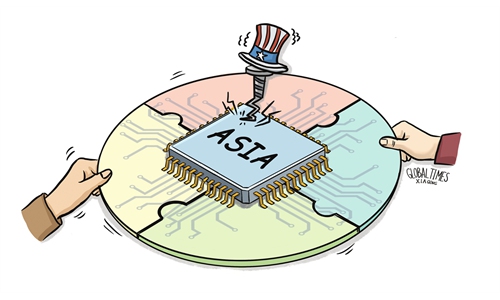
chip Photo:VCG
In a very outrageous way, the US gave South Korea a difficult problem and demanded a deadline for an answer. According to reports from South Korean media outlets, without negotiations and coordination in advance, the US unilaterally informed South Korea that it is scheduled to hold a meeting at the end of August on the so-called "Chip 4" alliance (US, Japan, South Korea and China's Taiwan). This puts South Korea in a more prominent dilemma. A source from the Blue House said that now it is hard to answer whether to participate, South Korean media reported. But pressure from Washington is mounting.The "Chip 4" alliance was proposed by the US in March this year. Its aim is to create a "semiconductor barrier" against the Chinese mainland. The Democratic Progressive Party authority and Japan are more proactive out of political factors. However, the South Korean government and related companies can judge only with common sense that participating in this event not only brings no incremental benefits, but puts them under the risk of damaging major interests. Statistics shows that South Korea's semiconductor exports reached $128 billion last year, and those to the Chinese mainland and Hong Kong accounted for 60 percent. Decoupling with such a large market is of no difference from commercial suicide. The US is now handing South Korea a knife and forcing it to do so.
South Korean officials have not clearly expressed their position so far, and the large number of domestic discussions in South Korea embodies the entangled and complex mentality from all walks of life: They are worried that exports to China will suffer a big blow, and that the US will impose penalties. South Korean public opinion compares the US to the "landlord" in the chip industry chain - rejecting US' request means South Korean chip industry may face the risk of being "vacated." The reason for South Korea's hesitation is evident. But in addition to weighing practical pros and cons, there is actually another factor that the South Korean government should take into consideration, that is, market principles and industrial development tendency.
Washington's rhetoric sounds appealing - as if when the "Chip 4" alliance is created, they could dominate the world and do whatever they want. But this can only be self-deception. The Chinese mainland is not only the largest market for South Korea's chip industry, but also the largest market in the world. How far can a technology that loses market prospects go? From ancient times to the present, which technology has been developed by "ideas" when no one uses it?
In fact, the question Washington throws at South Korea is not at all whether to strengthen the US-South Korea technical alliance, but whether Seoul is willing to sacrifice itself for the sake of Washington's geopolitical madness.
Now the US is clamoring to prevent "over-dependence" on Chinese mainland regarding the industrial chain, repeatedly advocating the risk of "cutting off supplies" by China. But the situation precisely shows that Seoul's weakness lies in its dependence on the US high-end chip technology, which is a crucial reason why Washington dares to force South Korea to join the "Chip 4" alliance. However, joining the alliance would only increase Seoul's dependence on the US and impose a ceiling over South Korea's chip industry. As a result, South Korea will drift away from its strategic goal of being a "global hub."
South Korea should have the courage to say no to US coercion. This is a matter of Seoul's realistic interests and is a litmus test for its independence and autonomy. It should not become an "enrollment fee" paid by South Korea to the US.
Apart from bullying allies, the US is also stepping up its internal policy coordination efforts. The US CHIPS Act, which has been in the works for more than two years, is being voted on in the Senate, with a proposed $52 billion in government subsidies for domestic semiconductor or chip manufacturing enterprises, but with restrictions on their investment in China. US Commerce Secretary Gina Raimondo said that Americans can "sleep easy at night" with only the bill passed and knowing "China won't eat our lunch." Clearly, Washington is trying to completely control the entire industrial chain. It doesn't care about the nightmares of its allies in order to let itself snore comfortably.
The development of the chip industry benefits directly from the globalized division of labor, and what the US is doing is shaking the foundations of the industry, even though it's not capable of holding up this industry chain by itself. It is known that there were South Korean chip companies that invested in the US but were soon trapped in trouble. Taiwan-based Foxconn announced back in 2017 to invest up to $10 billion to build a factory in Wisconsin, which was planned to be put into operation by the end of 2020, but by now it is still a wasteland. In other words, the carrot given by the US often cackles teeth, but the knife it wields can really sting. The international community should understand this and express clear opposition to Washington's crazy geopolitical plans.
To take a step back, even if the US really drags its allies into its coterie of industrial chain, the total population accounts only for 1/10 of the world. The US can be the king of this 1/10 of the world if it wants to be. What the extreme contraction of the market kills will be the future of the US technology industry. For Seoul, Washington's "ultimatum" was a blatant insult to a sovereign country. It is well known that Washington does not intend to show mercy to South Korea as it faces this dilemma, but it is also known that the market laws are even more ruthless to those who violate it.



